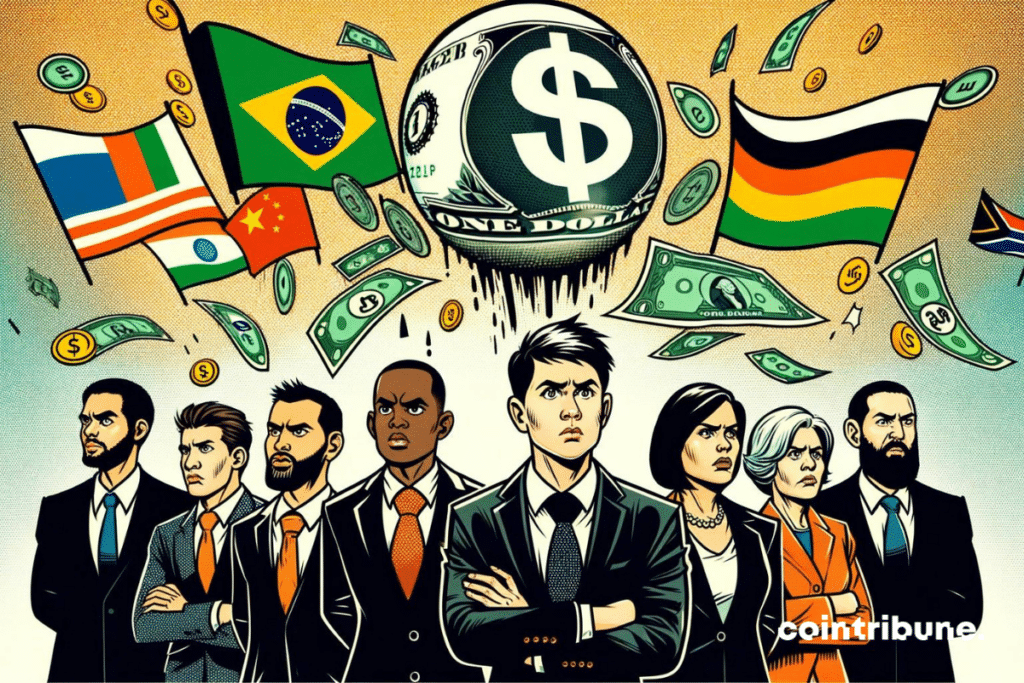BRICS: Here's why the alliance and several countries reject the dollar
Times are tough for the US dollar. Once a symbol of stability and a pillar of the global economy, it now faces a gradual erosion of its supremacy. Amid fluctuating monetary policies and geopolitical tensions, the foundations of its dominance are being questioned. Like the BRICS, many countries are abandoning the US dollar for various reasons.

The Reasons Behind the Gradual Abandonment of the Dollar by Several Countries
Many countries are turning away from the US dollar for several reasons. First, the erosion of the dollar’s purchasing power is alarming: since 1913, it has lost 99% of its value, a decline that has accelerated with the current monetary policy of the United States. The Federal Reserve is considering reducing interest rates three times a year, which could exacerbate inflation and undermine confidence in the dollar.
Furthermore, the economic sanctions imposed by the United States have isolated the country from several of its traditional allies. These measures have prompted the affected nations to look for alternatives for their international transactions, thus diminishing the global predominance of the dollar. Trade partners of these sanctioned nations are also adopting other currencies to avoid complications associated with the dollar.
Moreover, the staggering increase in the United States’ national debt, currently estimated at 34 trillion dollars and on track to reach 35 trillion, raises doubts about the long-term financial stability of the United States. This financial insecurity is one of the reasons why several countries are abandoning the dollar.
Finally, the strengthening of local and regional currencies, in particular the Chinese yuan, the Kenyan shilling, and the Russian ruble, indicates a growing interest in alternatives to the dollar. These currencies are gaining credibility and usage, reflecting a shift toward a more multipolar global financial system.
A Movement of De-Dollarization Led by the BRICS
The BRICS are actively seeking to reduce their dependence on the US dollar in international trade. These countries are encouraging the use of their own currencies in bilateral and regional transactions, which not only helps to strengthen their economic autonomy but also to destabilize the preeminence of the dollar.
In response to the long-uncontested hegemony of the American currency, the BRICS plan to create a common currency. An initiative that could significantly change the global financial system by offering a credible alternative to the dollar.
The BRICS’ efforts to establish a common reserve currency, as well as the increased reliability of regional currencies, indicate a global quest for a more balanced financial system less dependent on the dollar. This evolution could not only diversify the international monetary landscape but also reduce American economic hegemony in the future.
Maximize your Cointribune experience with our 'Read to Earn' program! Earn points for each article you read and gain access to exclusive rewards. Sign up now and start accruing benefits.
Diplômé de Sciences Po Toulouse et titulaire d'une certification consultant blockchain délivrée par Alyra, j'ai rejoint l'aventure Cointribune en 2019. Convaincu du potentiel de la blockchain pour transformer de nombreux secteurs de l'économie, j'ai pris l'engagement de sensibiliser et d'informer le grand public sur cet écosystème en constante évolution. Mon objectif est de permettre à chacun de mieux comprendre la blockchain et de saisir les opportunités qu'elle offre. Je m'efforce chaque jour de fournir une analyse objective de l'actualité, de décrypter les tendances du marché, de relayer les dernières innovations technologiques et de mettre en perspective les enjeux économiques et sociétaux de cette révolution en marche.
The views, thoughts, and opinions expressed in this article belong solely to the author, and should not be taken as investment advice. Do your own research before taking any investment decisions.